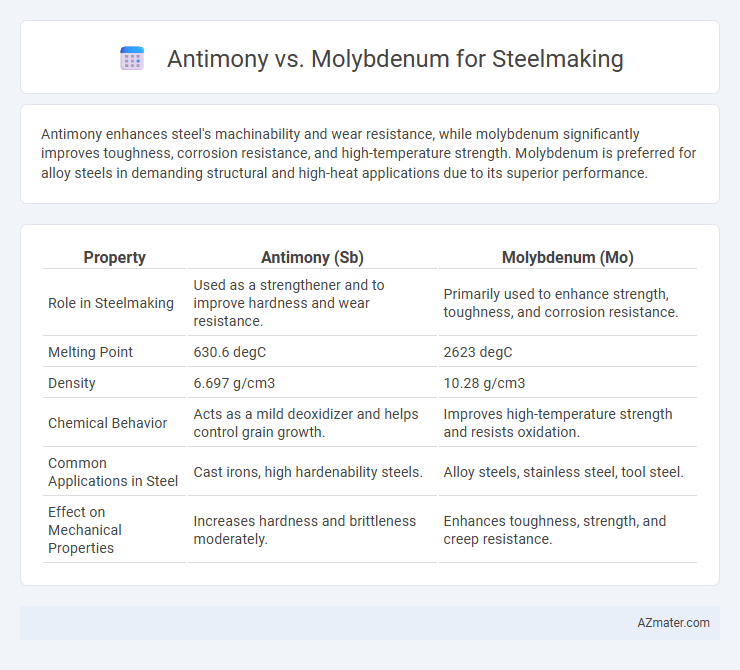Antimony enhances steel's machinability and wear resistance, while molybdenum significantly improves toughness, corrosion resistance, and high-temperature strength. Molybdenum is preferred for alloy steels in demanding structural and high-heat applications due to its superior performance.
Table of Comparison
| Property | Antimony (Sb) | Molybdenum (Mo) |
|---|---|---|
| Role in Steelmaking | Used as a strengthener and to improve hardness and wear resistance. | Primarily used to enhance strength, toughness, and corrosion resistance. |
| Melting Point | 630.6 degC | 2623 degC |
| Density | 6.697 g/cm3 | 10.28 g/cm3 |
| Chemical Behavior | Acts as a mild deoxidizer and helps control grain growth. | Improves high-temperature strength and resists oxidation. |
| Common Applications in Steel | Cast irons, high hardenability steels. | Alloy steels, stainless steel, tool steel. |
| Effect on Mechanical Properties | Increases hardness and brittleness moderately. | Enhances toughness, strength, and creep resistance. |
Overview of Alloying Elements in Steelmaking
Antimony and molybdenum are alloying elements used in steelmaking to enhance specific properties of steel. Molybdenum improves strength, hardness, and corrosion resistance, particularly in high-strength and stainless steels, by stabilizing carbides and refining grain structures. Antimony, although less common, is primarily used to increase hardness and improve machinability, but its applications are limited compared to the more versatile and widely utilized molybdenum.
Chemical Properties: Antimony vs Molybdenum
Antimony exhibits a low melting point of 630degC and behaves as a brittle metalloid with moderate oxidation resistance, influencing steel's hardness and machinability. Molybdenum has a much higher melting point of 2,623degC and acts as a transition metal with exceptional strength and corrosion resistance, significantly enhancing steel's toughness and high-temperature stability. Chemical interaction in steelmaking shows antimony tends to form stable compounds like stibnite (Sb2S3), while molybdenum forms complex carbides and solid solutions, crucial for improving wear resistance and structural integrity.
Influence on Mechanical Strength
Antimony enhances steel's mechanical strength by improving hardness and wear resistance, making it valuable in applications requiring abrasion resistance. Molybdenum significantly increases tensile strength and toughness, especially at high temperatures, by stabilizing carbides and reducing brittleness. The combined use of antimony and molybdenum in steel alloys optimizes mechanical performance through hardness and strength reinforcement.
Corrosion Resistance Comparison
Antimony improves steel corrosion resistance by forming a protective oxide layer that inhibits oxidation and sulfidation, making it effective in acidic and marine environments. Molybdenum enhances corrosion resistance through its ability to increase steel's pitting and crevice corrosion resistance, especially in chloride-containing and high-temperature applications. Comparing their effects, molybdenum provides superior performance in aggressive chloride environments, while antimony is more effective in preventing surface degradation in sulfur-rich conditions.
Effects on Steel Hardness and Toughness
Antimony enhances steel hardness by promoting grain refinement and improving wear resistance but may reduce toughness due to increased brittleness. Molybdenum significantly increases both hardness and toughness by stabilizing carbides and improving tempering resistance, making steel more resilient under high stress. The combined use of molybdenum and controlled antimony can optimize steel properties for specific industrial applications, balancing hardness and toughness.
Impact on Steel Weldability
Antimony negatively affects steel weldability by promoting brittleness and crack formation in welded joints, reducing the overall toughness and integrity of the weld. Molybdenum enhances steel weldability by improving hardenability and strength without compromising ductility, leading to more reliable and durable welds in high-stress applications. The presence of molybdenum also increases resistance to temper embrittlement and thermal stresses during welding, making it preferable for alloy steels requiring superior weld performance.
Cost Efficiency in Industrial Applications
Antimony and molybdenum serve distinct roles in steelmaking, with molybdenum generally offering superior cost efficiency due to its ability to enhance strength, hardness, and corrosion resistance at lower concentrations. The price of molybdenum, while higher per unit weight, translates to overall savings by reducing the amount of alloy needed and extending the service life of steel products. Antimony, often used for its flame retardant properties and machinability improvements, incurs less cost in raw material but may increase total expenses due to less significant performance benefits in steel alloys.
Environmental and Safety Considerations
Antimony, often used as a flame retardant in steel alloys, poses environmental challenges due to its toxicity and potential bioaccumulation, leading to strict regulations on emissions and disposal. Molybdenum, valued for enhancing steel strength and corrosion resistance, generally exhibits lower environmental toxicity but requires careful handling to prevent occupational exposure to its fine powders and dust. Steelmakers prioritize using molybdenum when aiming for improved environmental compliance and worker safety without compromising alloy performance.
Common Applications in Steel Alloys
Antimony enhances steel alloys by improving machinability and corrosion resistance, making it suitable for bearings, lead-acid battery plates, and antifriction parts. Molybdenum is widely used in steelmaking to increase strength, toughness, and resistance to high temperatures and corrosion, essential for stainless steels, high-strength low-alloy steels, and tool steels. Both elements contribute specific performance traits that optimize steel for diverse industrial applications such as automotive components, industrial machinery, and structural materials.
Selection Guidelines for Steelmakers
Steelmakers select antimony when enhancing castability and improving hardness in specialty steels, particularly in small quantities due to its role as a grain refiner and deoxidizer. Molybdenum is chosen for high-strength, corrosion-resistant steels, providing superior toughness and thermal stability, essential for high-performance alloys used in aerospace and industrial applications. The selection depends on the required mechanical properties, corrosion resistance, and thermal stability, with molybdenum favored for critical structural components and antimony for wear-resistant, abrasion-prone parts.

Infographic: Antimony vs Molybdenum for Steelmaking
 azmater.com
azmater.com